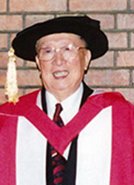

Born in Jiangsu Province in 1917, Professor Wu Jieping was, by the age of sixteen, studying medicine at the Peking Union Medical College. After graduation, he continued at the College which awarded him the degree of Doctor of Medicine. Shortly thereafter, he was appointed lecturer at the Medical Institute of Peking University. He then pursued postgraduate study of urological surgery at the University of Chicago, working under Charles Huggins who was to win a Nobel Prize for his breakthroughs in endocrinotherapy in clinical oncology. On his return home, two years later, Professor Wu began what was to be a long and distinguished career as China's leading urologist.
Founder of the Chinese Urological Society, Former President of the Chinese Academy of Medical Sciences, the Chinese Medical Association, and of the Peking Union Medical University, Professor Wu has also won international acclaim. He is a member, inter alia, of the International Association of Surgery, the International Association of Urological Surgery, and honorary member of the American Urological Surgery Society, the Royal College of Surgeons of Edinburgh, and the Japanese Urological Association. He was also elected honorary academician of the Hong Kong College of Surgeons.
As a researcher and clinician, Wu Jieping devised a number of innovative surgical techniques, including the use of a special urethral catheter for prostate hyperplasia surgery that came to be known as the Wu catheter. His team performed the first successful cadeveric kidney transplant in China in 1960. Among Professor Wu's research interests are the problems of late complications of renal tuberculosis, vas sterilisation, and adrenal surgery. He has published some twenty-one books and 150 articles. Professor Wu has attended senior political leaders of both China and foreign countries. Indeed, he has been accorded the title "Physician Extraordinary to Heads of State".
As a teacher, Professor Wu devoted himself tirelessly to the education and training of generations of medical students. Among China's leading urologists, many former students of his are to be counted.
But these achievements merely scratch the surface of an extraordinary life. In his late seventies, Professor Wu began serving his country in an altogether different capacity. He was elected a Vice-Chairman of both the 8th and 9th the Standing Committee of the National People's Congress. His wisdom and experience are in considerable demand by that body. Nor does Professor Wu show signs of flagging. His zeal remains undimmed. Two weighty causes now absorb much of his time and commitment. The first could justifiably be described as daunting: the crusade against tobacco smoking in Mainland China. He has initiated and developed various anti-smoking campaigns, and received the World Health Organization's gold medal in recognition of his efforts in this challenging sphere of health education. Secondly, he has been in the forefront of the movement to promote family planning on the Mainland.
You will not be surprised to learn, Mr Pro-Chancellor, that today's honour is far from the first to have been bestowed upon Professor Wu for his extraordinary accomplishments. He is a recipient of the Grand Medal of Paris, and the Suzuki Uro Medicine Award of Japan. He has been awarded the Chinese national award no less than seven times. He was decorated by the Royal Belgian Academy of Medicine which presented him its medal of honour. In 1997 the degree of Doctor of Science honoris causa was conferred on him by the Chinese University of Hong Kong to whose Faculty of Medicine he has made a signal contribution.
In 1995 the Wu Jieping Medical Fund for Urological Research was established. It seeks to develop research in this fielife has been characterised by acts of kindness and compassion. Yeats said "a man must choose ld and to assist young practitioners in this branch of medicine. Professor Wu's perfection of the life or of the work". Wu Jieping seems to have succeeded in not having exercised this choice. He has achieved distinction in both. To celebrate his magnanimity, his international eminence, and his tireless contribution to medical education, I commend to you, Mr Pro-Chancellor, Professor Wu Jieping, for the award of Doctor of Science, honoris causa.
Citation written and delivered by Professor Raymond Ivor Wacks, the Public Orator.



